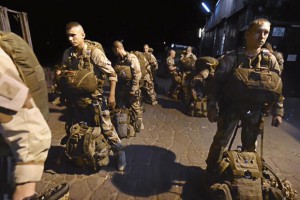Plans are being made in Washington, London, Paris and Rome for military intervention in Libya in the next few weeks, probably in March, to counter the rise of the so-called Islamic State (IS or ISIS or ISIL or Daesh).
Reports indicate that the government of Britain’s prime minister David Cameron is making preparations for a military intervention in Libya in the next few weeks. “Italians are doing a lot of surveillance, identification of targets for possible bombing by the British and Americans,” according to a British analyst.
British opposition leader Jeremy Corbyn said there were “growing signs that the British Government may be preparing to intervene militarily again in Libya,” and he is demanding that the Parliament be given a chance to debate any future plans for military intervention in Libya:
The Prime Minister should report to Parliament on what steps have already been taken – and, in particular, whether UK drones are being used to support armed forces or militias in Libya’s civil war by gathering intelligence for one side or the other.
We need an unequivocal assurance that no decision has been taken to use drones, over which Britain has control or partial control, in support of military operations in Libya. And he must make a clear commitment that MPs will be given the chance to debate in advance any decision to renew British military intervention in Libya.
During Saturday evening’s Republican candidate debate, there was one question about Libya asked of two candidates, Jeb Bush and Ben Carson. The question and Bush’s answer were (my transcription):
Question: Governor Bush, Libya is a country in chaos, there is no government. Defense officials said this week that there are now 5,000 ISIS fighters there roughly doubling previous estimates. We know you and others have been critical of the administration’s handling of initial airstrikes that you supported. This is a problem you would stand to inherit if you’re the next president. Reports this week said the administration is considering new air strikes, possible special operations raids. Would you support renewed airstrikes or any US involvement on the ground?
Bush: I would, and I would do it in concert again with our Arab allies, and with Europe most particularly in this case. This is the lesson learned in history: if you bomb something and not do anything as it relates to deal with the aftermath of this, if you don’t have a stable government, you get what we have in Libya, and leading from behind is not an effective policy. We have to lead. Without the United States, nothing seems to work. Europe doesn’t seem to have the ability to forward lead in this regard. And so dealing with the caliphate is important because it has now spawned in other areas, there have been 70+ attacks in 17 countries either inspired by ISIS or organized by ISIS, Libya being the most important one now.
We have to deal with the caliphate with building a Sunni army there, but we also have to deal with it in Libya, and I think the United States is ultimately is going to play a significant role in this.
The problem with the Obama administration is that they see this incrementally. They’re reluctant. They don’t lead. No one knows whether we’re serious. And when they do it, they do it in increments that you can barely see. The United States has to lead in a much more aggressive way than we’re doing right now.
Ben Carson’s response was as follows:
Carson: I wanna something say about this, because I’m not here just to add beauty to the stage. You know I’ve been talking about Libya for quite a long time. I think I was the first one to start talking about it. Because we have to have a proactive foreign policy strategy, and of course the next place that ISIS is gonna tack to is Libya. If you wanna expand your caliphate, and increase your influence, then you’re gonna wanna go to a place that’s strategically located. You go north across the Mediterranean, you’re into southern Europe; you go south, you’re into Chad and Sudan and Niger, and not to mention the fact you have much more oil than you do in Iraq.
That’s the kind of places they’re gonna go to. Therefore, we need to be thinking about how to prevent them from tacking over there. They’re already sending their fighters there. We need to be consulting with our military experts and asking them, what do they need in order to prevent ISIS from being able to take over Libya. That’s gonna have enormous consequences.
A British government spokesman said: “The UK, along with international partners, is supporting the process to form a recognized Libyan government. No decisions have been made about the future deployment of any British military forces to Libya as part of an international coalition force.” Independent (London)
breitbart.com



